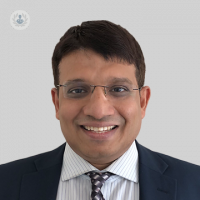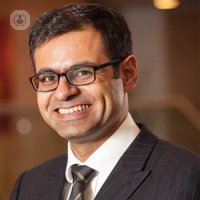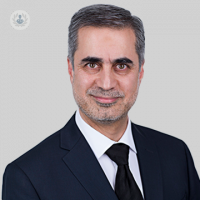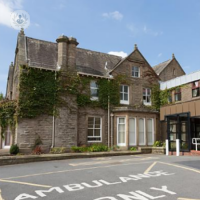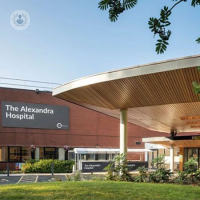What is radiofrequency denervation?
Radiofrequency denervation is an alternative treatment to treat all pain related to the neck and lower back. The denervation is carried out with the use of radio waves that, by heat energy destroy the nerves that are around the spine that generate pain. It’s also known as radiofrequency ablation or facet rhizolysis.
Why is radiofrequency denervation done?
Radiofrequency is done to combat pain generated by natural wear and tear, back injuries, disc wear and arthritis, among other problems. It’s only used when other treatments and physiotherapy have failed.
Radiofrequency solves health problems such as:
- Cervical pain
- Lower back pain
What does radiofrequency denervation involve?
The patient lies on their stomach and the area is numbed. A small thin tube is inserted into the spine over the neck or in the lower back. A special X-ray called a fluoroscope is used to lead the tube to the right place. A wire is then introduced through the tube that is connected to a radio wave generating machine that heats up and removes the nerve.
Preparation for radiofrequency denervation
No special preparation is needed for the test. The treatment can also be carried out alongside other conservative treatments and physiotherapy exercises.
After the procedure
Patients are taken to a recovery room after their procedure to be monitored and may have to lie flat for about 30 minutes or more. Normally they’ll be able to go home after one to three hours but will need someone to drive them home and stay with them for 24 hours. Side effects after the procedure can include numbness, a tingling sensation, mild bruising and tenderness.
Patients may experience pain after the procedure, but this should disappear within one to two weeks. After two weeks patients will begin to notice an improvement in their pain. Patients may also feel a tingling sensation around the area that was operated on. It is likely that the nerve will grow back, but it will not cause as much pain as it did prior to the procedure.
If a headache or fever develops or ongoing numbness or weakness is felt, call the hospital and let them know right away.
Radiofrequency denervation
What is radiofrequency denervation?
Radiofrequency denervation is an alternative treatment to treat all pain related to the neck and lower back. The denervation is carried out with the use of radio waves that, by heat energy destroy the nerves that are around the spine that generate pain. It’s also known as radiofrequency ablation or facet rhizolysis.
Why is radiofrequency denervation done?
Radiofrequency is done to combat pain generated by natural wear and tear, back injuries, disc wear and arthritis, among other problems. It’s only used when other treatments and physiotherapy have failed.
Radiofrequency solves health problems such as:
- Cervical pain
- Lower back pain
What does radiofrequency denervation involve?
The patient lies on their stomach and the area is numbed. A small thin tube is inserted into the spine over the neck or in the lower back. A special X-ray called a fluoroscope is used to lead the tube to the right place. A wire is then introduced through the tube that is connected to a radio wave generating machine that heats up and removes the nerve.
Preparation for radiofrequency denervation
No special preparation is needed for the test. The treatment can also be carried out alongside other conservative treatments and physiotherapy exercises.
After the procedure
Patients are taken to a recovery room after their procedure to be monitored and may have to lie flat for about 30 minutes or more. Normally they’ll be able to go home after one to three hours but will need someone to drive them home and stay with them for 24 hours. Side effects after the procedure can include numbness, a tingling sensation, mild bruising and tenderness.
Patients may experience pain after the procedure, but this should disappear within one to two weeks. After two weeks patients will begin to notice an improvement in their pain. Patients may also feel a tingling sensation around the area that was operated on. It is likely that the nerve will grow back, but it will not cause as much pain as it did prior to the procedure.
If a headache or fever develops or ongoing numbness or weakness is felt, call the hospital and let them know right away.
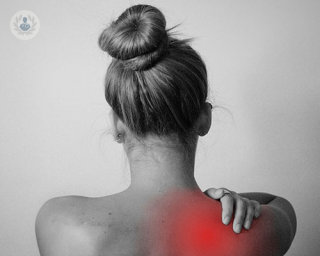

An expert’s guide to radiofrequency denervation
Dr Sumit Gulati
2024-12-31
Radiofrequency denervation is a pain treatment that kills or destroys nerve endings. In his latest article, renowned pain medicine consultant Dr Sumit Gulati explains this treatment, offering his expert advice to prospective patients. Mostrare di più
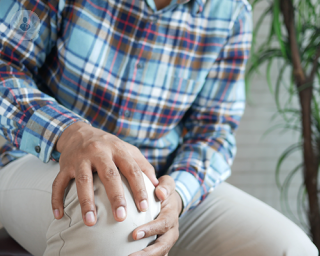

How radiofrequency denervation treats osteoarthritis
Dr Andrzej Krol
2024-12-30
Radiofrequency denervation is a novel treatment option for people suffering from chronic pain due to osteoarthritis that can help to enhance quality of life and reduce discomfort. Here, Dr Andrzej Krol, renowned consultant in anaesthesia and pain medicine, provides an expert insight into radiofrequency denervation for osteoarthritis, including its procedure, effectiveness, and compatibility with other treatments. Mostrare di più
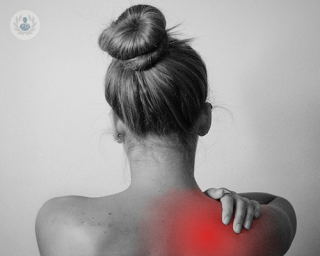

Suffering from shoulder pain? Expert advice on the most effective non-surgical forms of treatment
Dr Roshan Thawale
2024-12-27
Leading consultant in anaesthetics and pain medicine Dr Roshan Thawale details various non-surgical treatment options for shoulder pain in this expert guide. Mostrare di più


Back pain: Causes, types and treatment
Dr Jawaad Malik
2024-12-27
Back pain is a common but no less frustrating condition that can severely affect quality of life. Leading pain management specialist Dr Jawaad Malik discusses the causes, types and treatment, among other aspects of back pain management, in this informative article. Mostrare di più
Medici esperti in Denervazione da radiofrequenza
-
Dr Sarang Puranik
Unità del doloreEsperto in:
- Dolore alla spalla
- Dolore cervicale
- Dolore neuropatico
- Dolore cronico
- Denervazione da radiofrequenza
- Infiltrazioni articolari
-
Dr Salmin Aseri
Unità del doloreEsperto in:
- Dolore alla spalla
- Lombalgia
- Dolore cervicale
- Denervazione da radiofrequenza
- Cellule madri
- Lesioni sono danni
-
Mr Dan Plev
NeurochirurgiaEsperto in:
- Chirurgia spinale
- Vertebroplastica e cifoplastica percutanea
- Chirurgia della colonna mini invasiva
- Discectomia
- Sciatica
- Denervazione da radiofrequenza
-
Dr Sumit Gulati
Unità del doloreEsperto in:
- Denervazione da radiofrequenza
- Sciatica
- Dolore alle articolazioni
- Dolore neuropatico
- Dolore pelvico
- Dolore alla spalla
-
Dr Basil Almahdi
Unità del doloreEsperto in:
- Sciatica
- Dolore alla spalla
- Trattamento interventistico del dolore
- Dolore cervicale
- Dolore neuropatico
- Denervazione da radiofrequenza
- Visualizzare tutti

Beaumont Hospital - part of Circle Health Group
Beaumont Hospital - part of Circle Health Group
Old Hall Clough, Chorley New Rd, Lostock, BL6 4LA
No existe teléfono en el centro.
Se utilizzi questo numero di Top Doctors autorizzi al trattamento dei dati a fini statistici e commerciali. Per maggiori informazioni, leggi la nostra l’informativa sulla privacy
Top Doctors

The Alexandra Hospital - part of Circle Health Group
The Alexandra Hospital - part of Circle Health Group
Mill Ln, Cheadle, SK8 2PX
No existe teléfono en el centro.
Se utilizzi questo numero di Top Doctors autorizzi al trattamento dei dati a fini statistici e commerciali. Per maggiori informazioni, leggi la nostra l’informativa sulla privacy
Top Doctors

The Princess Grace Hospital - part of HCA Healthcare
The Princess Grace Hospital - part of HCA Healthcare
The Princess Grace Hospital, 42-52 Nottingham Pl, W1U 5NY
No existe teléfono en el centro.
Se utilizzi questo numero di Top Doctors autorizzi al trattamento dei dati a fini statistici e commerciali. Per maggiori informazioni, leggi la nostra l’informativa sulla privacy
Top Doctors
-
Beaumont Hospital - part of Circle Health Group
Old Hall Clough, Chorley New Rd, Lostock, BL6 4LA, BoltonEsperto in:
- Audiologia
- Chirurgia generale
- Chirurgia ortopedica
- Dermatologia
- Gestione del dolore
- Ernia
-
The Alexandra Hospital - part of Circle Health Group
Mill Ln, Cheadle, SK8 2PX, CheadleEsperto in:
- Anca
- Cardiologia
- Spalla e gomito
- Pediatria
- Piede e caviglia
- Ginocchio
-
The Princess Grace Hospital - part of HCA Healthcare
The Princess Grace Hospital, 42-52 Nottingham Pl, W1U 5NY, Central LondonEsperto in:
- Tumori
- Chirurgia generale
- Chirurgia ortopedica
- Chirurgia robotica
- Terapia intensiva
- Medicina dello sport
- Visualizzare tutti

